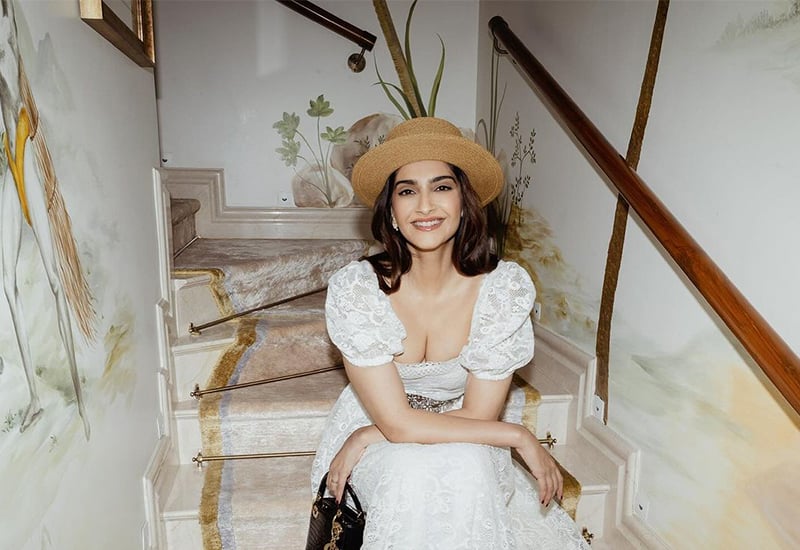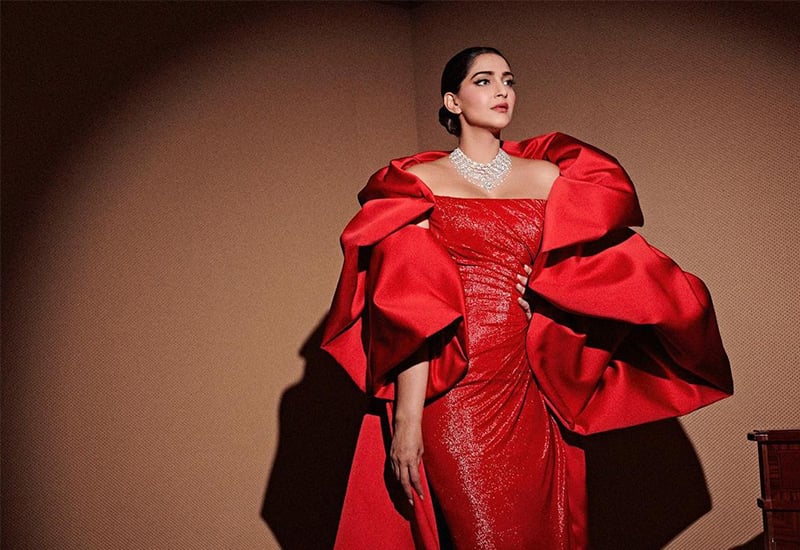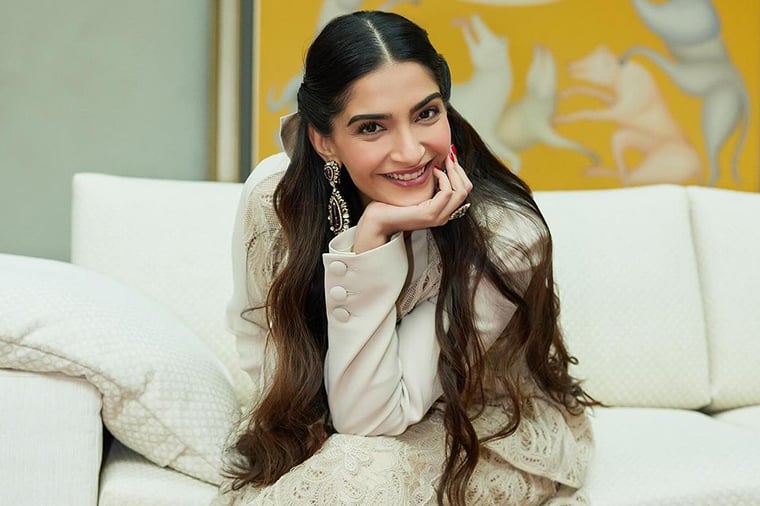We had the privilege of meeting Sonam Kapoor at the recent launch of Jamavar Dubai. Her presence in real life is as radiant as it is on celluloid. As a bonafide “girl’s girl,” Sonam made a special trip to Dubai to support her childhood best friend and restauranteur, Samyukta Nair, on the launch of her new restaurant.
Dressed in an elegant Carolina Herrera floral outfit, the actor was seen making her way through the room with ease — greeting everyone present with an innate warmth, a curious ear and an infectious smile.
عرض هذا المنشور على Instagram
As I conversed with Sonam, it was evident that her friendships are a cornerstone of her life. Her genuine affection for her friends, coupled with her unwavering loyalty, is a testament to the strong bonds she has formed. Just like the characters she has portrayed on screen, Sonam is a woman who values friendship, authenticity, and the power of human connection.
Sonam’s journey in the film industry has been nothing short of remarkable. Her debut in the critically acclaimed “Saawariya” (2007) marked her arrival as a promising talent, and her subsequent roles in films like “Delhi-6″ (2009),”Aisha” (2010), and “Neerja” (2016) solidified her position as a versatile actress. Known for her ability to portray complex characters with depth and nuance, Sonam has consistently pushed boundaries and challenged stereotypes.
Beyond her acting prowess, Sonam has also made a significant impact on the fashion industry. Renowned for her impeccable style and trendsetting choices, she has become a fashion icon both in India and internationally. Her fearless approach to fashion, coupled with her support for emerging designers, has helped elevate the Indian fashion scene to new heights.
Read below, the entire conversation in detail.
Given your almost two-decade-long career as an actor? Are there specific genres or character types that you’re drawn to now, or are you open to exploring new territories?
I’ve always believed that as an artist you constantly need to evolve – and as an actor, I have always been drawn to stories that are fresh and challenge the norm. Whether it was Aisha back in the day, which was one of the first few coming of age films for women to Neerja – the heart-numbing story of a flight attendant, I like stories that are usually unheard or unseen. In the future as well, I intend to push the envelope and be a part of stories that are unconventional – whether that is a gripping murder mystery or an out and out comedy, as long as it is a story that is fresh and interesting, I would love to hear it.
After becoming a mother, you decided to actively take a break. Has that experience liberated you creatively? Or did you still feel the pressure of being present and relevant that comes with being an actor?
Taking a break was a great decision and it allowed me to be present in the moment and enjoy time with my child. Similarly, getting back to work has been exciting too! Balancing my professional commitments with being a mother requires careful planning and support, but I’m grateful for the opportunity to pursue my passion while being there for my family.
How has becoming a mother impacted your perspective on life and your career? What are the most valuable lessons you’ve learned, and how have they shaped you as a person?
Motherhood is the most precious and fulfilling role in my life. It’s about unconditional love, nurturing, and being there for my child in every way possible. It has completely changed my perspective and taught me so much about patience, compassion, and selflessness. It’s been a beautiful experience watching my little one grow and explore the world around him.
عرض هذا المنشور على Instagram
Your passion for fashion is evident in everything you do, especially in your support for emerging designers. What drives your commitment to highlighting brands that focus on textiles and crafts?
The stories and culture behind textiles and intricate craftsmanship ties back to our Indian roots and they should be celebrated. India has incredible talent with traditional artisans creating masterpieces in corners of our country and as artists ourselves, it’s our responsibility to showcase these skills at a global level. By supporting these brands when I am wearing a piece of clothing, I’m carrying a piece of our heritage.
You’ve recently worn a custom-made gown by Syrian designer Amir Al Kasm. How does this choice align with your broader goal of promoting designers from regions that aren’t traditionally considered fashion capitals?
Designers like Amir bring a unique and different perspective that reflects their cultural heritage and experiences which I really liked. It is good to explore designers and styles beyond the conventional norms and there is so much one can find – even the cultures that clothing from other countries bring is a breath of fresh air. There is incredible talent everywhere and it’s great to find that match your fashion.
Your homes in Mumbai and London reflect a unique blend of maximalism and chic. What are the key elements that you prioritize when designing your personal spaces, and how do they reflect your personality and lifestyle?
I like to create a place which tells a story, while also keeping in mind comfort is of utmost importance because at the end of the day, your house has to be comfortable to live in. Each place tells a story and reflects unique heritage or art or something that has a personal connection to me. Lastly comfort, it’s important that your home is inviting and overall is a mix of style and sophistication.

As a frequent attendee of the Cannes Film Festival, you’ve represented many Middle Eastern designers. Who are your favorites, and what makes their work stand out?
I’ve had the privilege of wearing some truly remarkable Middle Eastern designers at Cannes, and a few of my favorites include Ashi Studio, Zuhair Murad, Elie Saab, and Rami Kadi. Ashi Studio’s creations are simply breathtaking—the sculptural designs and meticulous craftsmanship make every piece a true work of art. Zuhair Murad and Elie Saab are synonymous with red carpet glamour. Their gowns are rich in detail, with embroidery and embellishments that create a sense of timeless elegance. Rami Kadi brings a bold, avant-garde touch that’s refreshingly modern while still rooted in heritage. I also admire Georges Hobeika for his dreamy, feminine designs and how his work blends opulence with lightness. Each of these designers brings something unique to the table, and they all stand out for their ability to balance tradition with contemporary style.

Given your global fashion sensibility Sonam, are there any UAE-based brands or designers that you admire or frequently shop from?
Absolutely! One of my go-to UAE-based brands is Bouguessa—I love her minimalist yet chic aesthetic. Her designs are modern, sleek, and effortlessly stylish, making them perfect for everyday wear as well as special occasions. There’s an understated elegance in her work that really resonates with me. In addition to Bouguessa, I also admire Madiyah Al Sharqi for her refined, feminine silhouettes, and Rami Al Ali for his beautifully intricate gowns that marry tradition with modernity. Amato Couture is another standout, with their avant-garde approach to fashion, and I also appreciate Taller Marmo, which perfectly blends vintage glamour with contemporary design. The UAE’s fashion scene is vibrant and forward-thinking, and I find myself constantly inspired by the creativity and craftsmanship of these designers.
– For more on luxury lifestyle, news, fashion and beauty follow Emirates Woman on Facebook and Instagram
Images: Supplied











